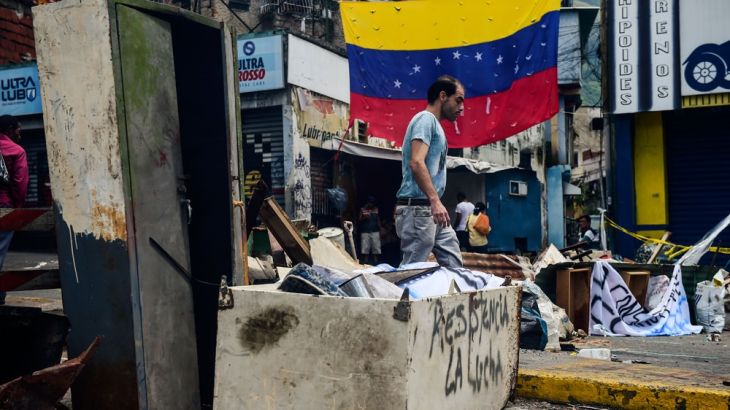Maduro hails Constituent Assembly election victory
Officials say eight million people cast ballots in election to pick a new legislative body to rewrite constitution.

Venezuelan President Nicolas Maduro has claimed victory in an election to pick a controversial new constitution-writing body that prompted deadly violence and international condemnation.
Venezuela’s National Electoral Council announced on Sunday that more than eight million people voted to grant Maduro’s ruling Socialist Party virtually unlimited powers with a Constituent Assembly.
The turnout was more than double the estimates of both the government’s political opponents and independent experts.
“We have a Constituent Assembly,” Maduro said in a speech to hundreds of supporters in central Caracas after the electoral authority put the voter turnout at 41.5 percent.
“It is the biggest vote the revolution has ever scored in its 18-year history.”
Maduro was referring to the year his mentor Hugo Chavez came to power.
READ MORE: All you need to know about Venezuela’s vote
The voting started at 6am local time on Sunday with almost 20 million Venezuelans registered to cast their ballots, according to Telesur, a pro-government pan-Latin American media network.
The final count was met with mockery and anger from members of the opposition, who said they believed between two million and three million people voted.
The opposition parties had boycotted the polls, which they say were aimed at consolidating Maduro’s power.
Al Jazeera’s Lucia Newman, reporting from Caracas, said: “This [turnout] is something that the government clearly needed to show legitimacy for this election.”
She said that the opposition had predicted the government would come up with an elevated figure and they are disputing the large turnout announced.
“The actual numbers, whatever they may be, will certainly be a bone of contention for some time to come,” she said.
‘Sad and bloody day’
Earlier in the day, at least 10 people, including an election candidate, were killed as anti-Maduro protesters clashed with the police.
Shootings at protests killed a 13-year-old and a 17-year-old in the western state of Tachira. A soldier was also shot dead there.
The death toll included a 30-year-old regional leader of a youth opposition party in the northeast town of Cumana and two protesters in the western state of Merida.
Anti-Maduro activists wearing hoods or masks erected barricades on roads and scuffles broke out with security forces who moved in quickly to disperse the demonstrators.
![Clashes broke out between anti-Maduro protesters and police [Carlos Garcia Rawlins/Reuters]](/wp-content/uploads/2017/07/19af99b9ec8e47d388e96ac94a059662_18.jpeg)
“The ’emperor’ Donald Trump wanted to halt the Venezuelan people’s right to vote,” Maduro said as he voted at 6am in a low-income area of Caracas.
|
|
Maduro, elected in 2013, has faced months of protests for presiding over a debilitating economic crisis that has seen a high inflation rate and shortages of food and other basic amenities.
He pressed ahead with the vote to create the all-powerful constituent assembly or temporary parliament despite US sanctions and months of violence which have claimed the lives of around 120 people.
The opposition called for new protests on Monday and Wednesday against the inauguration of the Constituent Assembly.
“We do not recognise this fraudulent process,” Henrique Capriles, a senior opposition leader, said on Sunday at the end of the controversial election, which was marred by violence.
Capriles spoke of a “black day” and blamed what he termed Maduro’s “sick ambition”.
Al Jazeera’s Newman said it was a “sad and bloody day in Venezuela”.
She said that half a dozen protesters with bullet wounds were taken to neighbouring Colombia for treatment.
Foreign opposition
Several regional governments, including the US, have voiced opposition to the controversial election.
The US condemned the election and threatened to impose new “strong and swift” sanctions.
Nikki Haley, the US ambassador to the UN, on Sunday called the election a “sham” and “step towards dictatorship”, adding that the US will not accept “illegitimate government”.
To show the scale of public anger, the Venezuelan opposition earlier this month organised an unofficial referendum over Maduro’s plan.
More than seven million voters rejected the constituent assembly and voted in favour of early elections.
READ MORE: Venezuela constitutional vote marred by violence, death
The opposition’s attempt last year to hold a recall referendum against Maduro was rejected, regional elections have been postponed and Maduro has repeatedly ignored the opposition-controlled Congress.
Javier Farje, a Latin America political analyst, says Maduro’s government is not going to rewrite the constitution but is going to “introduce nine reforms in the current constitution”.
“I believe the only solution is to restart the dialogue that was suspended in December 2016 when the opposition abandoned the dialogue because they disagreed with the government,” he told Al Jazeera.
“They have to go back to the negotiating table. The Constituent Assembly should not be seen as an obstacle for that. It is not going to replace the current National Assembly, let’s make it clear. The National Assemby can still do its job.”
|
|